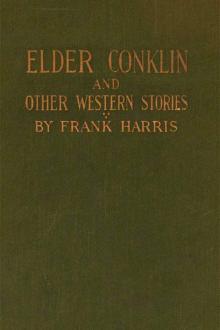Elder Conklin - Frank Harris (i am malala young readers edition .TXT) 📗

- Author: Frank Harris
- Performer: -
Book online «Elder Conklin - Frank Harris (i am malala young readers edition .TXT) 📗». Author Frank Harris
The Professor did not at once grasp the situation in so far as he himself was concerned. But he divined the cause of the lawyer’s irritability, and refrained from pushing the argument further. The discussion could, indeed, serve no purpose, save to embitter the quarrel. He therefore answered quietly:
“I didn’t come here to dispute with you. I came to see May. Is she in?”
“No, I think not. I believe she went out some time ago.”
“In that case I’ll go home. Perhaps you’ll tell her I called. Good day.”
“Good day!”
As the Professor left the house his depression of the morning returned upon him. He was dissatisfied with himself. He had intended to show no anger, no resentment, and, nevertheless, his temper had run away with him. He recognized that he had made a grave mistake, for he was beginning to foresee the consequences of it. Trained to severe thinking, but unaccustomed to analyze motives, the full comprehension of Hutchings’ attitude and its probable effects upon his happiness only came to him gradually, but it came at length so completely that he could remember the very words of the foregoing conversation, and recall the tones of the voices. He could rebuild the puzzle; his understanding of it, therefore, must be the true one. The irrationality of the defence was a final proof that the lawyer had played him false. “Hutchings sold himself—most likely for place. He didn’t fear a quarrel with me—that was evident; perhaps he wishes to get rid of me—evident, too. He believes that I shall be dismissed, or else he wouldn’t have laid stress upon the importance of my keeping my position. When I spoke of May he was curt. And the explanation? He has wronged me. The old French proverb holds true, ‘The offender seldom forgives.’ He’ll probably go on to harm me further, for I remind him of his vileness. This, then, is life, not as I imagined it, but as it is, and such creatures as Hutchings are human beings. Well, after all, it is better to know the truth than to cheat oneself with a mirage. I shall appreciate large natures with noble and generous impulses better, now that I know how rare they are.”
In his room he found May awaiting him. Across his surprise and joy there came an intense admiration of her, a heart-pang of passionate gratitude. As she moved towards him her incommunicable grace of person and manner completed the charm. The radiant gladness of the eyes; the outstretched hands; the graceful form, outlined in silver-grey; the diadem of honey-coloured hair; something delicate yet courageous, proud yet tender in her womanhood remained with him ever afterwards.
“Ah, May!” The word seemed to bring joy and tingling life to his half-numbed heart. He seized her hands and drew her to him, and kissed her on the hair, and brows, and eyes with an abandonment of his whole nature, such as she had never before known in him. All her shyness, her uneasiness vanished in the happiness of finding that she had so pleased him, and mingled with this joy was a new delightful sense of her own power. When released from his embrace she questioned him by a look. His emotion astonished her.
“My love,” he said, kissing her hands, “how good of you to come to me, how sweet and brave you are to wait for me here! I was growing weak with fear lest I should lose you, too, in the general wreck. And you came and sat here for me patiently—Darling!”
There was a mingling of self-surrender and ruffled pride in her smiling reproach:
“Lose me? What do you mean? I waited for you last night, sir, and all this weary morning, till I could wait no longer; I had to find you. I would have stayed at home till you came; I meant to, but father startled me: he said he was afraid you’d lose your place as Professor in spite of all he had done for you. ‘Twas good of him, wasn’t it, to give up running for Mayor, so as not to embitter Gulmore against you? I was quite proud of him. But you won’t lose your post, will you? Has anything serious happened?—Dear!”
He paused to think, but he could not see any way to avoid telling her the truth. Disappointments had so huddled upon him, the insight he had won into human nature was so desolating that his heart ached for sympathy and affection. He loved her; she was to be his wife; how could he help winning her to his side? Besides, her words voiced his own fears—her father had already begun to try to part them. She must know all and judge. But how? Should he give her “The Tribune” to read? No—it was vindictive.
“Come and sit down, May, and I’ll tell you what happened yesterday. You shall judge for yourself whether I was right or wrong.”
He told her, point by point, what had occurred. May listened in silence till he stopped.
“But why did he resign? What could he gain by that?”
While she was speaking a thought crimsoned her cheeks; she had found the key to the enigma. Three nights before her father had talked of Washington and the East with a sort of exultation. At the time she had not paid much attention to this, though it had struck her as very different from his habit. Now the peculiarity of it confirmed her suspicion. In some way or other his action in resigning was connected with his inexplicable high spirits. A wave of indignation swept over her. Not that she felt the disgust which had sickened the Professor when he first heard of the traitorism. He had condemned Mr. Hutchings on the grounds of public morality; May’s anger was aroused because her father had sought to deceive her; had tried by lying suggestion to take credit to himself, whereas—
“I wouldn’t have believed it,” she murmured, with the passionate revolt of youth against mean deceit. “I can never forgive him or trust him again.”
“Don’t let us talk of it any more, dear. I wouldn’t have told you only I was afraid that he would try to separate us. Now I know you are on my side I wouldn’t have you judge him harshly.”
“On your side,” she repeated, with a certain exaltation of manner. “On your side always in spite of everything. I feel for you more intensely than for myself.” In a lower voice and with hesitating speech she added: “Did he—did he tell you that he resigned on your account?”
He nodded.
“And you’re not angry?”
“No.” He smiled slightly. “I understand men better now than I did yesterday. That’s all.”
“Oh, but you ought to be mad. I am. How can you—”
“Let us talk, dear, of what concerns us more. Have you heard anything? From what your father said I half fear that the meeting tomorrow may go against me. Has no one called?”
“Professor Krazinski. I saw his card on the table when I came in. You think it’s a bad sign that he’s the only one?”
“I’m afraid so. It may be merely anxiety, but I’m growing suspicious of every one now. I catch myself attributing low motives to men without reason. That electioneering has infected me. I hate myself for it, but I can’t help it; I loathe the self-seeking and the vileness. I’d rather not know men at all than see them as they’ve shown themselves lately. I want to get away and rinse my mouth out and forget all about it—away somewhere with you, my sweet love.”
“But you mustn’t let them condemn you without an effort.” While speaking she put her hand on his shoulder and moved close to him. “It might injure us later. And you know you can persuade them if you like. No one can listen to you without being won over. And I want you to keep your post; you love teaching and you’re the best teacher in the world, ah—”
He put his arms round her, and she bowed her head on his neck, that he might not see the gathering tears.
“You’re right, dear. I spoke hastily. I’ll do my best. It won’t be as bad as we think. My colleagues are men of some education and position. They’re not like the crowd of ignorant voters and greedy place-hunters; they’ll listen to reason, and”—half bitterly—“they’ve no motive to do me wrong. Besides, Krazinski has called, and I scarcely know him; perhaps the others didn’t think of coming. It was kind of him, wasn’t it? I’m very grateful to him. He must be a good fellow.”
“What has he done so wonderful? Oh, my!”—and she turned her face up to his with half-laughing deprecation—“I’m afraid I’m deteriorating too. I can’t hear you praise any one now without feeling horribly jealous. Yes, he must be good. But don’t be too grateful to him, or—I must be going now, and, oh! what a long time it’ll be until tomorrow! I shall have grown old before—tomorrow.”
“Sweetheart! You’ll come here and wait for me in the afternoon, won’t you? I shall want to see you so much.”
“Yes, if you like; but I intended to go up to the University—mayn’t I? It’ll seem ages—aeons—waiting here by myself.”
“The meeting will not last long, and I’ll come to you as soon as it’s over. Darling, you don’t know how much you have helped me. You have given me courage and hope,” and he folded her in his arms.
*
Mr. Gulmore liked to spend his evenings with his wife and daughter. It amused him to hear what they had been doing during the day. Their gossip had its value; sentimental or spiteful, it threw quaint sidelights upon character. On the evening before the Faculty meeting Ida was bending over a book, while Mr. Gulmore smoked, and watched her. His daughter was somewhat of a puzzle to him still, and when occasion offered he studied her. “Where does she get her bitterness from? I’m not bitter, an’ I had difficulties, was poor an’ ignorant, had to succeed or go under, while she has had everythin’ she wanted. It’s a pity she ain’t kinder….”
Presently Mrs. Gulmore put away her work and left the room. Taking up the thread of a conversation that had been broken off by his wife’s presence, Mr. Gulmore began:
“I don’t say Roberts’ll win, Ida. The bettin”s the other way; but I’m not sure, for I don’t know the crowd. He may come out on top, though I hev noticed that young men who run into their first fight and get badly whipped ain’t likely to fight desperate the second time.—Grit’s half trainin’!”
“I wish I could be there to see him beaten!” Ida had tried to turn her wounded pride into dislike,





Comments (0)